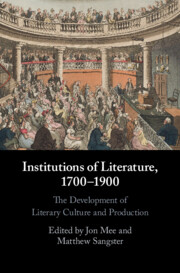Book contents
- Institutions of Literature, 1700–1900
- Institutions of Literature, 1700–1900
- Copyright page
- Contents
- Figures
- Contributors
- Acknowledgements
- Introduction Literature and Institutions
- Chapter 1 Knowledge Exchange in the Seventeenth Century
- Chapter 2 ‘Supporting Mutual Benevolence’
- Chapter 3 Institutions without Addresses
- Chapter 4 Eighteenth-Century Musenhof Courts as Bridges and Brokers for Cultural Networks and Social Reform
- Chapter 5 Becoming Institutional
- Chapter 6 Circulating Libraries as Institutional Creators of Genres
- Chapter 7 Lecturing Networks and Cultural Institutions, 1740–1830
- Chapter 8 Catalogues as Instituting Genres of the Nineteenth-Century Museum
- Chapter 9 Charles Lamb and the British Museum as an Institution of Literature
- Chapter 10 A Disruptive and Dangerous Education and the Wealth of the Nation
- Chapter 11 ‘The Ladies’ Contribution’
- Chapter 12 ‘[L]etters Must Increase’
- Chapter 13 Networks, Nodes, and Beacons
- Chapter 14 The Book as Medium
- Index
Chapter 2 - ‘Supporting Mutual Benevolence’
Libraries, Civic Benefaction, and the Spalding Gentlemen’s Society, 1709–1755
Published online by Cambridge University Press: 30 June 2022
- Institutions of Literature, 1700–1900
- Institutions of Literature, 1700–1900
- Copyright page
- Contents
- Figures
- Contributors
- Acknowledgements
- Introduction Literature and Institutions
- Chapter 1 Knowledge Exchange in the Seventeenth Century
- Chapter 2 ‘Supporting Mutual Benevolence’
- Chapter 3 Institutions without Addresses
- Chapter 4 Eighteenth-Century Musenhof Courts as Bridges and Brokers for Cultural Networks and Social Reform
- Chapter 5 Becoming Institutional
- Chapter 6 Circulating Libraries as Institutional Creators of Genres
- Chapter 7 Lecturing Networks and Cultural Institutions, 1740–1830
- Chapter 8 Catalogues as Instituting Genres of the Nineteenth-Century Museum
- Chapter 9 Charles Lamb and the British Museum as an Institution of Literature
- Chapter 10 A Disruptive and Dangerous Education and the Wealth of the Nation
- Chapter 11 ‘The Ladies’ Contribution’
- Chapter 12 ‘[L]etters Must Increase’
- Chapter 13 Networks, Nodes, and Beacons
- Chapter 14 The Book as Medium
- Index
Summary
This chapter examines the motivations for and practices of library formation, development and management exercised by the Spalding Gentlemen’s Society (SGS), Britain’s oldest provincial learned society and second oldest museum. It contends that civic philanthropy in the form of library formation served as a core activity for SGS members throughout the first fifty years of the Society’s history, and as a key component of the society’s raison d’être. The SGS’s extensive archival and bibliographical holdings provide a means of examining the modes of acquisition, cataloguing and circulation of the three libraries under the SGS’s management in the period 1710–1755: the parish library of St Mary and St Nicolas, the library of Spalding Grammar School, and the library housed in the SGS museum. Spalding’s libraries provide a composite case study that reveals the interconnection of individual and institutional forms of philanthropy at work in eighteenth-century libraries. At the same time, the SGS emerges as a precursor of the later eighteenth-century subscription libraries and literary and philosophical societies that engaged in library formation as a means of fostering sociability, education, improvement and intellectual exchange in local communities throughout Britain.
Keywords
- Type
- Chapter
- Information
- Institutions of Literature, 1700–1900 , pp. 44 - 64Publisher: Cambridge University PressPrint publication year: 2022
- 1
- Cited by

